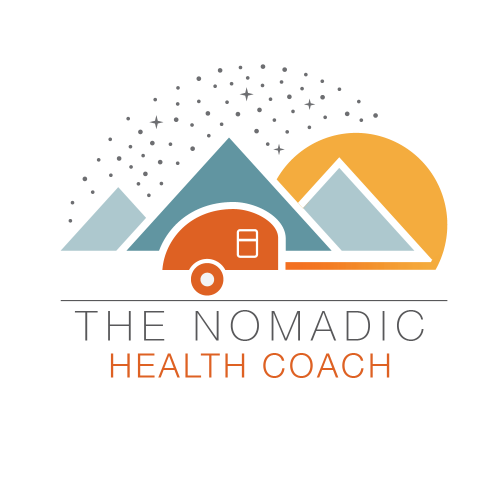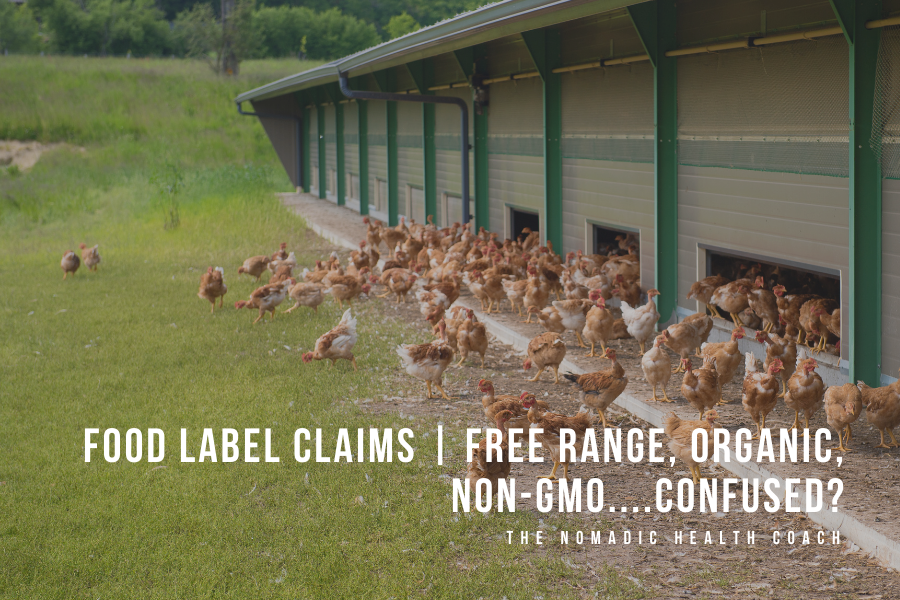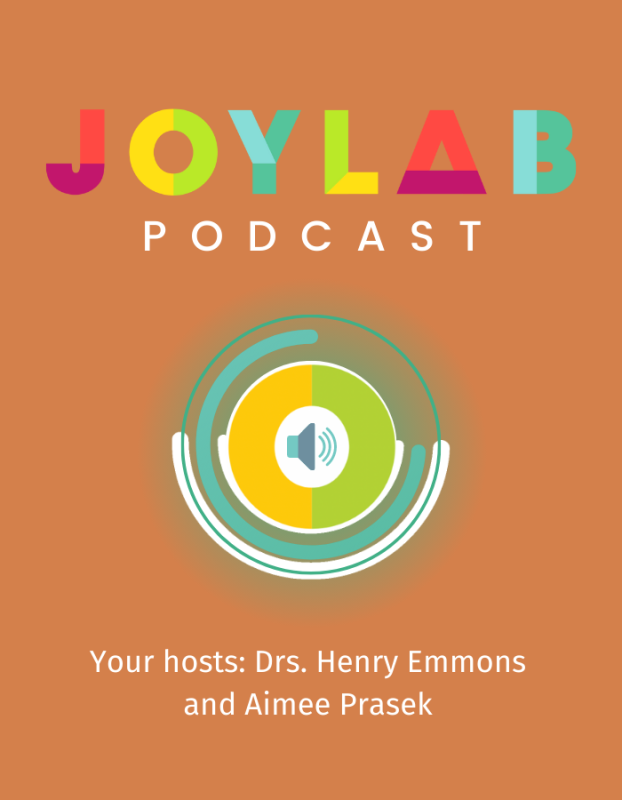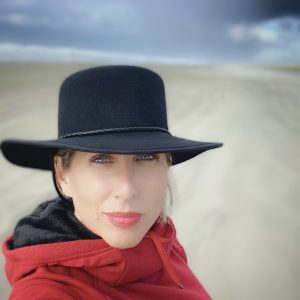HOW TO READ AND UNDERSTAND FOOD LABEL CLAIMS.
Words like “free-range,” “grass-fed,” “cage-free”, “pasture raised”, “nonGMO”, “antibiotic-free”, “natural,” and “organic” are everywhere these days. But what do these food label claims really mean and which are the best to choose?
Many food labels can be confusing, so knowing what a food label truly means is a great way to educate yourself about where your food comes from and how it’s been processed and produced. Below is a list of common food claims. There’s always new food label claims popping up, so if you come across a new phrase, be sure to take some time to do your own research and learn what it really means.
I’m leading with the labels we should be cautious of because these terms are what most of us are exposed to at our local grocery store. Start to look for the labels—and choose the products—listed in the ‘best” category as often as possible for a healthier body and planet. There is no independent verification system for the following labels. While the government has minimum standards for some (though not all) of these labels, compliance might be verified through self-reporting.
Be Cautious Of:
- ANTIBIOTIC-FREE – Antibiotics are often given to livestock animals to prevent and manage diseases. “Antibiotic-free” means that an animal was not given antibiotics during its lifetime. Other phrases to indicate the same approach include “no antibiotics administered” and “raised without antibiotics.” This label does not ensure poultry or meat are are sustainable, organic, humanely raised, or free of hormones.
- CAGE-FREE – “Cage-free” is for egg-laying hens and means they are raised without cages, but the hens usually live indoors in barns or warehouses. It does not restrict other problematic practices of raising hens, such as overcrowded conditions or beak cutting.
- FREE-RANGE/ROAMING – The use of the terms “free-range” or “free-roaming” are only defined by the USDA for egg and poultry production. To receive the label, the producer must demonstrate there is outdoor access, but does not need to to specify the quality or size of the space, or whether or not the birds actually go there. Claims are defined by the USDA, but are not verified by third-party inspectors.
- HEALTHY – Foods labeled “healthy” must be low in saturated fat and contain limited amounts of cholesterol and sodium. Certain foods must also contain at least 10 percent of the following nutrients: Vitamins A or C, iron, calcium, protein, or fiber.
- NO HORMONES ADDED OR ADMINISTERED – Hormones are often used in the production of livestock to speed the growth rate or increase milk production in an animal. You may see the label on beef products, but hormones are not allowed by law in the use of raising pigs or poultry, so it is unnecessary to label them as hormone-free. The USDA has prohibited use of the term “hormone-free,” but animals that were raised without added growth hormones can be labeled “no hormones administered” or “no added hormones.”
- NATURAL – The FDA mandates that products with this label must explain the use of the term, such as no added colors or flavorings, minimally processed, etc. The term “natural” refers to processing, not farming practices. “Natural” foods are not necessarily sustainable, organic, humanely raised, or free of hormones and antibiotics.
- VEGETARIAN-FED – “Vegetarian-fed” means that the livestock were raised on a diet without animal products. It does not define welfare practices.
GOOD
- MADE WITH ORGANIC INGREDIENTS – These food products must contain 70-94 percent organic ingredients by weight but will not have the USDA Organic symbol on them. Instead, up to three organic ingredients may be listed on the front of the package. Companies may use the words “made with organic ingredients on product labels. The USDA monitors this label, which isn’t as strong as the “best” labels, below, but it is still a good choice. Products with less than 70 percent organic ingredients can identify them on the side panel. Organic foods prohibit the use of hydrogenation and trans fats.
BEST BETS:
- ANIMAL WELFARE APPROVED – Animals are raised on pasture or range on true family farms with stringent welfare standards, from breeding to slaughter.
- DEMETER BIODYNAMIC – Biodynamic farms use methods that are holistic, ecologically sustainable, and minimize reliance on external inputs. The Demeter Biodynamic standards also require that at least 10 percent of the farm is set aside as a biodiversity reserve.
- FAIR TRADE – The “fair trade” label means that farmers and workers, often in developing countries, have received a fair wage and worked in acceptable conditions while growing and packaging the product. The food meets the supply chain standards of local sustainability, decent working conditions, and fair prices for farmers and workers.
- GMO-FREE, NON-GMO, OR NO GMOS – GMOs, or genetically modified organisms, are plants or animals that have been genetically engineered with DNA from bacteria, viruses, or other plants and animals. The highly controversial, and often hated Monsanto (now Bayer), is the main producer of GMO seeds and Roundup ready insecticides. Products can be labeled “GMO-free” if they are produced without being genetically engineered through the use of GMOs.
- NON-GMO PROJECT VERIFIED – Assures that a product contains less than 0.9 percent GMOs, which allows for accidental contamination. It does not preclude the use of toxic pesticides and fertilizers.
- GRAIN-FED – Animals raised on a grain diet are labeled “grain-fed.” Check the label for a “100% vegetarian diet” claim to ensure that the animals were given feed containing no animal by-products.
- GRASS-FED – This label appears on beef and means the animals were fed grass, their natural diet, rather than grains. It indicates that the American Grass-Fed Association (AGFA) verifies a 100 percent forage diet, no confinement of the cattle, and no antibiotics or added hormones. In addition to being more humane, grass-fed meat is more lean and lower in fat and calories than grain-fed meat. Grass-fed animals are not fed grain, animal by-products, synthetic hormones, or antibiotics to promote growth or prevent disease; although they may have been given antibiotics to treat disease. A “grass-fed” label doesn’t mean the animal necessarily ate grass its entire life. Some grass-fed cattle are grain-finished, which means they ate grain from a feedlot prior to slaughter. Look for “grass-fed and grass-finished.”
- HERITAGE – A “heritage” label describes a rare and endangered breed of livestock or crops. Heritage breeds are traditional livestock that were raised by farmers in the past, before industrial agriculture drastically reduced breed variety. These animals are prized for their rich taste and usually contain a higher fat content than commercial breeds. Production standards are not required by law, but true heritage farmers use sustainable production methods. This method of production saves animals from extinction and preserves genetic diversity. Look for “heritage” turkeys during the holiday season.
- NON-IRRADIATED – This label means that the food has not been exposed to radiation. Meat and vegetables are sometimes irradiated (exposed to radiation energy) to kill disease-causing bacteria and reduce the incidence of food-borne illness. No thorough testing has been done to know if irradiated food is safe for human consumption.
- PASTURE-RAISED – “Pasture-raised” indicates that the animal was raised on a pasture where it was able to eat nutritious grasses and other plants rather than being fattened on grain in a feedlot or barn. Pasturing livestock and poultry is a traditional farming technique that allows animals to be raised in a humane manner. Animals are able to move around freely and carry out their natural behaviors. This term is very similar to “grass-fed,” though the term “pasture-raised” indicates more clearly that the animal was raised outdoors on pasture.
- RBGH-FREE OR RBST-FREE – Recombinant bovine growth hormone (rBGH) or recombinant bovine somatotropin (rBST) is a genetically engineered growth hormone that is injected into dairy cows to artificially increase their milk production. The hormone has not been properly tested for safety and is not permitted in the European Union, Canada, and some other countries. Milk labeled “rBGH-Free” is produced by dairy cows that never received injections of this hormone. Most milk produced in the U.S. contains the rBGH or rBST hormone as it is not required by law to include it on the label. Organic milk is rBGH free.
- ORGANIC – All organic agricultural farms and products must meet the following guidelines (verified by a USDA-approved independent agency):
- Abstain from the application of prohibited materials (including synthetic fertilizers, pesticides, and sewage
sludge) for three years prior to certification and then continually throughout their organic license. - Prohibit the use of GMOs and irradiation.
- Employ positive soil building, conservation, manure management, and crop rotation practices.
- Provide outdoor access and pasture for livestock.
- Refrain from antibiotic and hormone use in animals.
- Sustain animals on 100% organic feed
- Avoid contamination during processing of organic products.
- Keep records of all operations.
- Abstain from the application of prohibited materials (including synthetic fertilizers, pesticides, and sewage
If a product contains the “USDA Organic” seal, it means that 95 to100 percent of its ingredients are organic.





